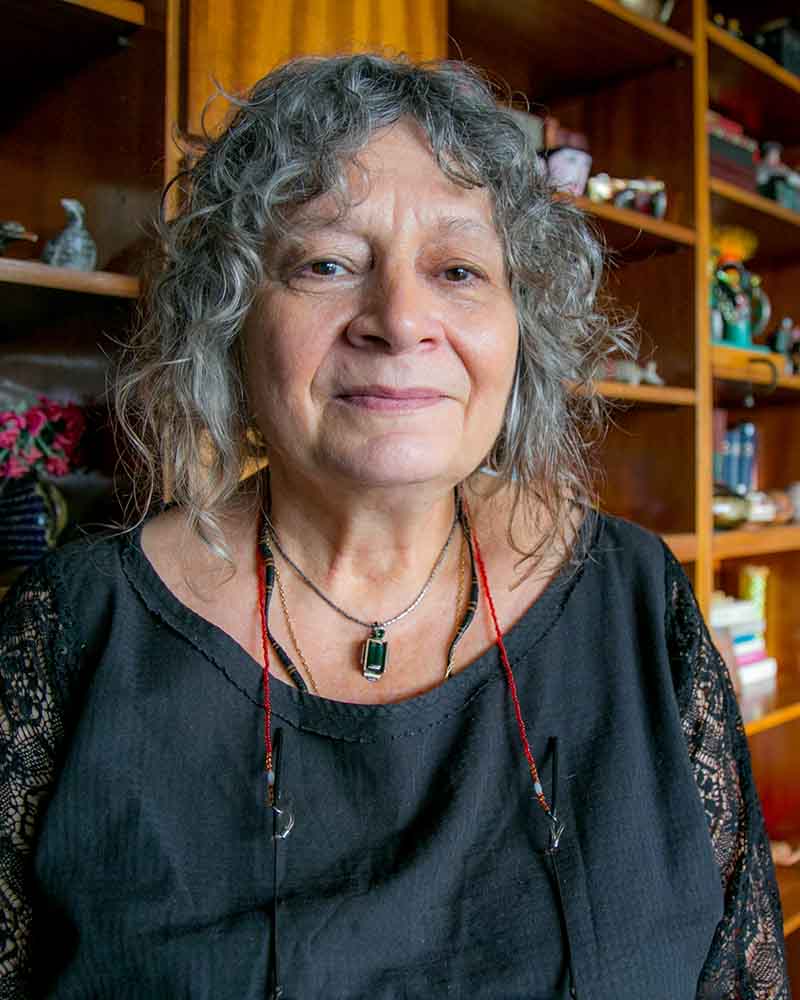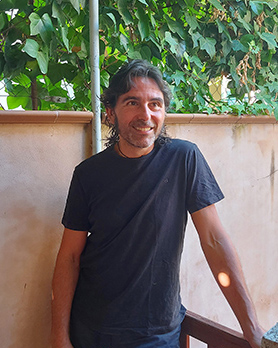Rita Segato

Rita Segato is Doctor in Philosophy from the Department of Social Anthropology at Queen’s University Belfast (1984) and Professor Emeritus in Anthropology and postgraduate courses in Bioethics and Human Rights at the University of Brasilia. Senior researcher at the Brazilian National Council for Scientific and Technological Development, she holds the Aníbal Quijano Chair at the Museo Nacional Centro de Arte Reina Sofía in Madrid and directs the Rita Segato Chair for Uncomfortable Thought at the National University of San Martín in Argentina. She is currently one of the directors of the International Course on Afro-Latin American and Caribbean Studies at the Latin American Council of Social Sciences and is also visiting researcher and speaker at postgraduate seminars in numerous academic institutions in the United States, Europe and Latin America. In 2017 and 2018, the Spanish news agency EsGlobal included her among the most influential Ibero-American intellectuals.
She has received various awards including the Latin American and Caribbean Award for Social Sciences (2018), the Frantz Fanon Award from the Caribbean Philosophical Association (2021, for lifetime achievement), the Daniel Cosío Villegas Award for Social Sciences from the College of Mexico (2022) and the Saint Ignatius of Loyola of the Jesuit Order Silver Medal from the Ibero-American University of Mexico (2018), as well as receiving honorary doctorates from the universities of Salamanca, Salta, Cuyo, Villa María, Catamarca, Entre Ríos and Córdoba.
She has collaborated with various human rights organisations and promoted a pioneering measure for racial inclusion and diversity in higher education in Brazil. She is the author of numerous publications on gender, racism and coloniality.
Aina Calafat

Aina Calafat is the daughter of a British organic farmer and an upholsterer from Valldemossa. She has a degree in Biology and a master’s degree in Organic Agricultural Production and in International Politics and Cooperation. She worked for almost 20 years at the Balearic Council of Organic Agricultural Production as supervisor and director. She was manager and head of project coordination for the Agriculture and Fisheries Improvement Services, a state-owned company run by the Government of the Balearic Islands. She has worked as an independent consultant on projects dealing with agroecology, food sovereignty and the implementation of public certification systems for organic food production in several Latin American countries and in Palestine, and also worked as a teacher in the training of professionals specialised in organic agricultural production systems. She is currently responsible for political impact and international projects at Spanish Society of Organic Agriculture and Agroecology (SEAE) (www.agroecologia.net).
Monica Di Donato

Monica Di Donato has a doctorate in Economics, with a thesis that analyses the physical flows and environmental impacts of the consumption models of households in the different regions of Spain. Her research interests are linked to the field of environmental economics, both with regard to the theoretical dimension of the approach and, on a more applied level, the analysis of the energy and material dimension of economic systems from the perspective of social metabolism, especially in regards to the food system. She is currently associated with the GEEDS research group at the University of Valladolid. She works as a researcher at FUHEM Ecosocial (Madrid), a laboratory dedicated to the interpretation and analysis of the complex reality that our society is going through from a socio-ecological perspective, developing projects in the field of strong sustainability towards scenarios of social and environmental transition.
Aniol Esteban

Aniol Esteban has a degree in Biology from the University of Barcelona and a master’s degree in Environmental Economics from University College London. He has dedicated most of his professional career to uniting the worlds of ecology and economics by making visible the benefits that the conservation of nature and sustainable management of natural resources bring to our economy and society. Since 2017, he has directed the Marilles Foundation, a non-profit organisation that works for the conservation of the Balearic Sea. He previously worked at the New Economics Foundation and the Royal Society for the Protection of Birds, as well as in various European biodiversity conservation projects linked to institutions such as the Swedish Environmental Protection Agency, the Generalitat de Catalunya and the Lisbon Oceanographic Institute. He is passionate about the sea and whenever he can, puts on his goggles and snorkel and goes underwater to observe and enjoy the many species that inhabit the Balearic Sea.
Yayo Herrero

Yayo Herrero is aconsultant, researcher and professor in the fields of political ecology, ecofeminism and education for sustainability. She has a degree in Social and Cultural Anthropology, a qualification in Social Education and Agricultural Technical Engineering, and a Diploma of Advanced Studies in Educational Theory and Social Pedagogy. She is currently a partner at Garúa S. Coop. Mad. and teacher at various Spanish universities. She is author and co-author of more than thirty books and regularly collaborates with various media outlets.
Jaime Vindel

Jaime Vindel has a doctorate in Art History and a master’s degree in Philosophy and Social Sciences. His is a researcher for the Ramón y Cajal Grant Programme (2018) of the Institute of History of the Spanish Higher Council for Scientific Research (CSIC), where he is Head of Research for the research projects Fossil Aesthetics: A Political Ecology of the History of Art, Visual Culture and Cultural Imaginaries of Modernity (PIE, ref. 202010E005) and Energetic Humanities: Energy and Sociocultural Imaginaries Between the Industrial Revolution and the Socio-Environmental Crisis (PID2020-113272RA-I00, HUMENERGE). He was coordinator of the Cultural Ecologies section of the Independent Studies Programme of the Museu d’Art Contemporani de Barcelona (2017–2018 and 2019–2020 editions) and is the author of books including Estética fósil. Imaginarios de la energía y crisis ecosocial (Arcadia, 2020), La Familia Lavapiés: arte, cultura e izquierda radical en la transición española (La Bahía, 2019), Arte conceptual en los límites del lenguaje y la política (Brumaria, 2015, 2016 and 2019) and La vida por asalto: arte, política e historia en Argentina entre 1965 y 2001 (Brumaria, 2014). He was also the editor, among other publications, of the volume Visualidades críticas y ecologías culturales (Brumaria, 2018) and, together with Jesús Carrillo, issue No. 8 of the collection Desacuerdos. Sobre arte, políticas y esfera pública en el Estado español (MACBA, 2014).
Ivan Murray

Ivan Murray is aprofessor in the Department of Geography at the University of the Balearic Islands (UIB). He has a PhD in Geography from the UIB and an MS (Master of Science) in Environmental Sustainability from the University of Edinburgh. He has taught undergraduate, graduate and master’s degrees in geography and tourism studies. His lines of research are framed within the perspective of critical geography, bringing together forms of analyses from political economics, political ecology and sustainable economics. His research focuses on studying the spatial logics of capitalist tourism, its contradictions and its associated conflicts. His publications include the following books: Geografies del capitalisme balear (UIB, 2012), Capitalismo y turismo en España (Alba Sud Editorial, 2015), Turistificación global. Perspectivas críticas en turismo (Icaria, 2019), Tourism and Degrowth (Routledge, 2020) and #TourismPostCOVID19. Turistificación confinada (Alba Sud Editorial, 2021).
He has also published numerous academic articles. He is a member of the Research Group on Sustainability and Territory of the UIB and of the Transdisciplinary Research Group on Socio-ecological Transitions of the Autonomous University of Madrid (UAM), and is part of the editorial teams of Scripta Nova and Political Ecology magazines. He also participates in environmentalist and anti-capitalist social movements. Among others, he is linked to Grup d’Ornitologia i Defensa de la Naturalesa (GOB) and was part of the Tot Inclòs collective. He also collaborates with the Alba Sud organisation in relation to the critical analysis of touristification and the search for counter-hegemonic alternatives.
